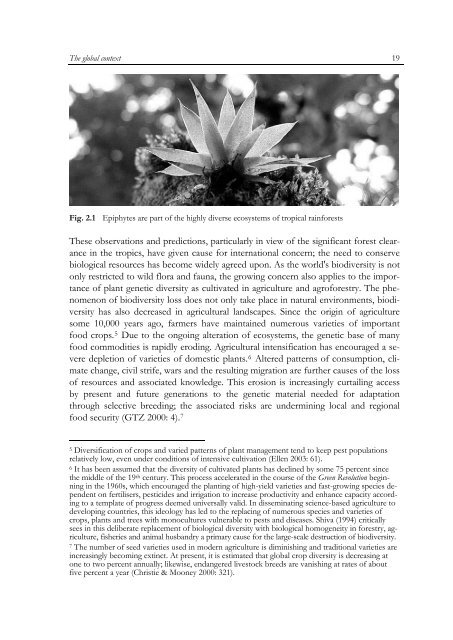The cultural context of biodiversity conservation - Oapen
The cultural context of biodiversity conservation - Oapen
The cultural context of biodiversity conservation - Oapen
Create successful ePaper yourself
Turn your PDF publications into a flip-book with our unique Google optimized e-Paper software.
<strong>The</strong> global <strong>context</strong><br />
Fig. 2.1 Epiphytes are part <strong>of</strong> the highly diverse ecosystems <strong>of</strong> tropical rainforests<br />
<strong>The</strong>se observations and predictions, particularly in view <strong>of</strong> the significant forest clearance<br />
in the tropics, have given cause for international concern; the need to conserve<br />
biological resources has become widely agreed upon. As the world's <strong>biodiversity</strong> is not<br />
only restricted to wild flora and fauna, the growing concern also applies to the importance<br />
<strong>of</strong> plant genetic diversity as cultivated in agriculture and agr<strong>of</strong>orestry. <strong>The</strong> phenomenon<br />
<strong>of</strong> <strong>biodiversity</strong> loss does not only take place in natural environments, <strong>biodiversity</strong><br />
has also decreased in agri<strong>cultural</strong> landscapes. Since the origin <strong>of</strong> agriculture<br />
some 10,000 years ago, farmers have maintained numerous varieties <strong>of</strong> important<br />
food crops. 5 Due to the ongoing alteration <strong>of</strong> ecosystems, the genetic base <strong>of</strong> many<br />
food commodities is rapidly eroding. Agri<strong>cultural</strong> intensification has encouraged a severe<br />
depletion <strong>of</strong> varieties <strong>of</strong> domestic plants. 6 Altered patterns <strong>of</strong> consumption, climate<br />
change, civil strife, wars and the resulting migration are further causes <strong>of</strong> the loss<br />
<strong>of</strong> resources and associated knowledge. This erosion is increasingly curtailing access<br />
by present and future generations to the genetic material needed for adaptation<br />
through selective breeding; the associated risks are undermining local and regional<br />
food security (GTZ 2000: 4). 7<br />
5 Diversification <strong>of</strong> crops and varied patterns <strong>of</strong> plant management tend to keep pest populations<br />
relatively low, even under conditions <strong>of</strong> intensive cultivation (Ellen 2003: 61).<br />
6 It has been assumed that the diversity <strong>of</strong> cultivated plants has declined by some 75 percent since<br />
the middle <strong>of</strong> the 19 th century. This process accelerated in the course <strong>of</strong> the Green Revolution beginning<br />
in the 1960s, which encouraged the planting <strong>of</strong> high-yield varieties and fast-growing species dependent<br />
on fertilisers, pesticides and irrigation to increase productivity and enhance capacity according<br />
to a template <strong>of</strong> progress deemed universally valid. In disseminating science-based agriculture to<br />
developing countries, this ideology has led to the replacing <strong>of</strong> numerous species and varieties <strong>of</strong><br />
crops, plants and trees with monocultures vulnerable to pests and diseases. Shiva (1994) critically<br />
sees in this deliberate replacement <strong>of</strong> biological diversity with biological homogeneity in forestry, agriculture,<br />
fisheries and animal husbandry a primary cause for the large-scale destruction <strong>of</strong> <strong>biodiversity</strong>.<br />
7 <strong>The</strong> number <strong>of</strong> seed varieties used in modern agriculture is diminishing and traditional varieties are<br />
increasingly becoming extinct. At present, it is estimated that global crop diversity is decreasing at<br />
one to two percent annually; likewise, endangered livestock breeds are vanishing at rates <strong>of</strong> about<br />
five percent a year (Christie & Mooney 2000: 321).<br />
19

















